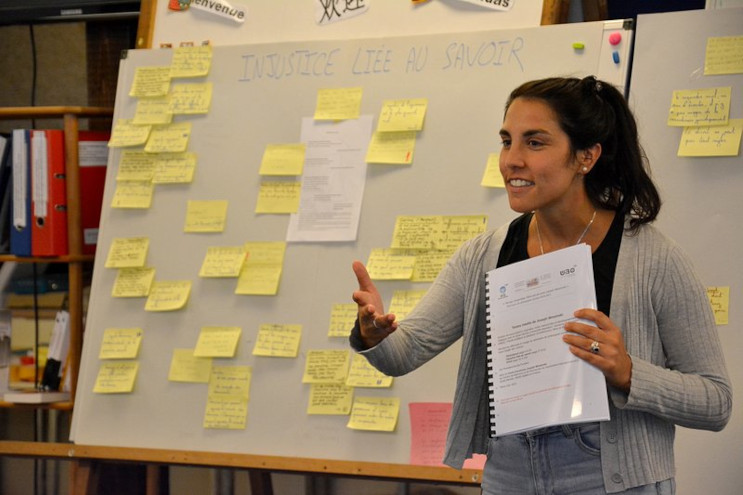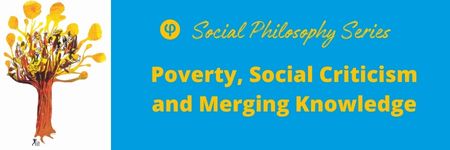Poverty and Questions of Knowledge and Epistemic Injustice

Above: Anaclara Acuña
Written by Anaclara Acuña and originally published in the Revue Quart Monde n°265. Ms. Acuña interned as a research assistant at the Joseph Wresinski Archives and Research Centre (JWC) and took part in ATD Fourth World’s social philosophy project: “Thinking About the Social Being With Joseph Wresinski.”

This article is part of our Social Philosophy Series – Poverty, Social Criticism and Merging Knowledge.
Inequitable access to epistemic goods
Questions of knowledge and epistemic injustice are an essential part of the struggle against poverty, and have therefore been part of ATD Fourth World’s work since the very beginning; for example, during my internship at the JWC, I noticed references to “knowledge”, “access to education”, “lack of credibility”, “priceless opinion”, and “ignorance” in the archives.
Inequitable access to epistemic goods, such as education and information, is not the only knowledge-related injustice faced by people in poverty; being wronged as a knower and speaker is also part of epistemic injustice, writes Miranda Fricker in her book “Epistemic Injustice: Power and the Ethics of Knowing” (2007). The English philosopher explores this injustice through two new terms to literature: testimonial injustice and hermeneutical injustice.
Testimonial injustice
Testimonial injustice occurs when bias causes the listener to place a an unfair valuation of credibility on the words of speakers; it is when a person’s credibility or trustworthiness is diminished based on their perceived social identity. Hermeneutical injustice occurs when one’s experiences or identities are not understood or recognized by society, and takes place when there is a gap in our collective understanding or language to fully grasp and interpret certain aspects of someone’s experiences. In simple terms, hermeneutical injustice happens when a person’s story or truth is not adequately understood or acknowledged due to a lack of shared understanding or vocabulary.
People living in extreme poverty are often confronted with hermeneutical and testimonial injustices. According to Ms. Fricker there are different types of prejudices which cause testimonial injustice.
For instance, a “negative identity bias” causes a listener to give less credibility to a speaker’s words because of their identity.
Moreover, people in poverty can suffer testimonial injustice when institutions – and society in general – give them less credibility because of their socio-economic status.
Stereotypes
During my research using the JWC archives, I discovered various stereotypes commonly used by society to describe people in poverty, which dehumanize the person and deprive them of their dignity. I made a list and all of these words used to create negative stereotypes and reinforce the mainstream’s perception of people in poverty: words like “irredeemable”, “lazy”, “irresponsible”, and “immature”.
Ms. Fricker argues that when testimonial injustice is persistent and systemic, it becomes oppression, and it can be repressive or silent. A similar phenomena is described in post-colonial development studies; Gayatri Chakravorty Spivak – a post-colonial theorist literary critic, and professor at Columbia University – describes the concept of “epistemic violence”, which refers to the violence exerted on the knowledge of non-Western indigenous peoples. Ms. Spivak talks of the “unheard voices” or the “underlings1“: the dominated, who have been deprived of their voice and their power to act. They can’t explain who they are, and when they try, they’re not understood.
Joseph Wresinski
This concept is at the heart of Joseph Wresinski’s – founder of ATD Fourth World – thinking. He described how the sights he saw in the emergency homeless camp in Noisy-le-Grand outside Paris, where ATD Fourth World was founded, showed him that constant poverty keeps people silent:
“When people are trapped in extreme poverty, feelings of helplessness, guilt, fear and anger, as well as loss of hope for the future, silence those who try to survive.”
They tend not to speak up to avoid making enemies or being misunderstood, because they know that what they say will be used against them.
According to Wresinski, this way of treating those in poverty causes them to live in constant fear of being deemed “crazy” by society, which to some extent explains their paralysis and inability to express themselves. They might think, “I’m going to say something stupid, I’m not going to be understood, I’m going to misspeak, I’m going to be judged, I’m going to be pigeonholed, I’m going to be shunned, I’m going to look like a fool.”
Hermeneutical injustice, testimonial injustice
One difference between hermeneutical injustice and testimonial injustice is that the former is structural in nature. And because hermeneutical injustice generally occurs when a speaker is trying to make their experiences understood, they tend to suffer a double harm: “one, through structural harm in the shared hermeneutical process, and the other, through the hearer’s judgment of credibility with their identification prejudices.”2
Haguenau conference
At a conference in Haguenau, France, in 1973, Joseph Wresinski said that people in poverty are often punished for their actions, when in reality nobody explained the rules to them. As a result, they do not try to access public services because they do not want to be humiliated. For example, in areas of extreme poverty in France, many women did not register their children to avoid being called “rabbit mothers.”
This shows a pattern of hermeneutical injustice stemming from a lack of collective resources which causes the most disadvantaged groups, people in poverty, to be marginalized. They are unable to participate equally in the formation of social norms, and are resultantly deprived of a power they should be entitled to. They are not understood by the rest of society.
This reminds me of a sentiment an ATD Fourth World activist once shared with me: she told me that she felt a tremendous sense of loneliness and sadness after having her children removed by social services, and that the only strength she found to survive was though having another child. From an affluent, Western perspective, a decision like this is often seen as reckless and irresponsible. But in reality, for that mother, it was an act of resistance.
Ms. Fricker outlines two aspects of the harm of hermeneutical injustice: a person’s resultant inability to make their feelings understandable, and the loss of trust and interest in knowledge.
To illustrate this, Wresinski explained at the Haguenau conference the response of a young girl who was asked why she did not go to school:
“Oh no, it’s not because of the teacher! When I came back from school, I wasn’t able to have something to eat, and all day my stomach was hurting because I didn’t eat! Often when I got to class in the morning, I hadn’t slept all night because we only had one bed and my father would scream in annoyance! So when the teacher would ask me questions, I wouldn’t be able to answer. Then I was told I was stupid that I couldn’t answer the question! Then I became anxious and I thought I was stupid. So I couldn’t learn at school.”
This quote makes it clear that hermeneutical injustice is part of a larger social injustice: there is no one person to blame, and it affects a variety of different dimensions of a person’s life.
The example above not only shows how hermeneutical injustice works, but it also shows how testimonial injustice works: she is evaluated unfairly and because of her perceived credibility, she is not trusted and considered a stupid person. Epistemic injustice, according to Ms. Fricker, undermines a person’s ability to learn, share experiences and knowledge, inflicts deep wounds to the person, and is detrimental to the construction of identity. It prevents the subject from being a social being3.
Ignorance: A Key Factor
According to Wresinski, “ignorance” helps the perverse cycle of poverty continue. Through the reading of different Wresinski texts, we can see that “ignorance” has two meanings: the uninformedness of people in poverty – which prevents them from exercising their rights, accessing education, communicating, understanding, being able to develop, etc. – but also the bewilderment of dominant society to poverty and those who live in it.
Wresinski emphasized the significance of ignorance by explaining that it is not the ignorance of a single person, but rather that it encompasses the whole community and is transmitted from generation to generation. Sometimes this ignorance is so deep that even children who go to school cannot overcome it. It explicitly constitutes exclusion and isolation, because being uninformed means not being able to understand what is happening – being condemned to insecurity and to incoherence – because one does not have the knowledge necessary to understand cause and prevent consequence.
Contributory injustice
“Contributory injustice” is introduced by Kristie Dotson – a feminist philosopher – as a third type of epistemic injustice. This is where a perceiver deliberately refuses to use the right tools to understand a speaker, and she defines this injustice as being caused by the ignorance of an epistemic agent. It is a deliberate hermeneutical ignorance that inflicts harm on the epistemic capacity of a knower.
This point is important, because Wresinski asserts that extreme poverty exists because of our ignorance. He explains that “our ignorance of extreme poverty means that despite the good will of so many, extreme poverty still exists” To that end, in various speeches Wresinski and his allies have questioned what is known about poverty, what data and information is available, and what needs to be collected.
After summarizing the different examples of epistemic injustices faced by people living in poverty, we still have to ask ourselves how to overcome them.
I think that ATD Fourth World’s approach – one based on the recognition and personal development of people in poverty, founded on the thinking of its founder Joseph Wresinski, and honed through a plethora of the projects and activities carried out over the years – are useful instruments in the fight against knowledge-related injustices, and can provide valuable answers to the struggle against poverty.
- G.C. Spivak, Can the Subaltern Speak?, in Marxism and the interpretation of Culture. Chicago: University of Illinois Press, 1988, pp. 271–273.)
- M. Fricker, Epistemic Injustice: Power and the Ethics of Knowing, Epistemic Injustice, Oxford University Press:159, 2007.)
- Miranda Fricker, Epistemic Injustice: Power and the Ethics of Knowing, Epistemic Injustice, Oxford University Press, 2007.)

